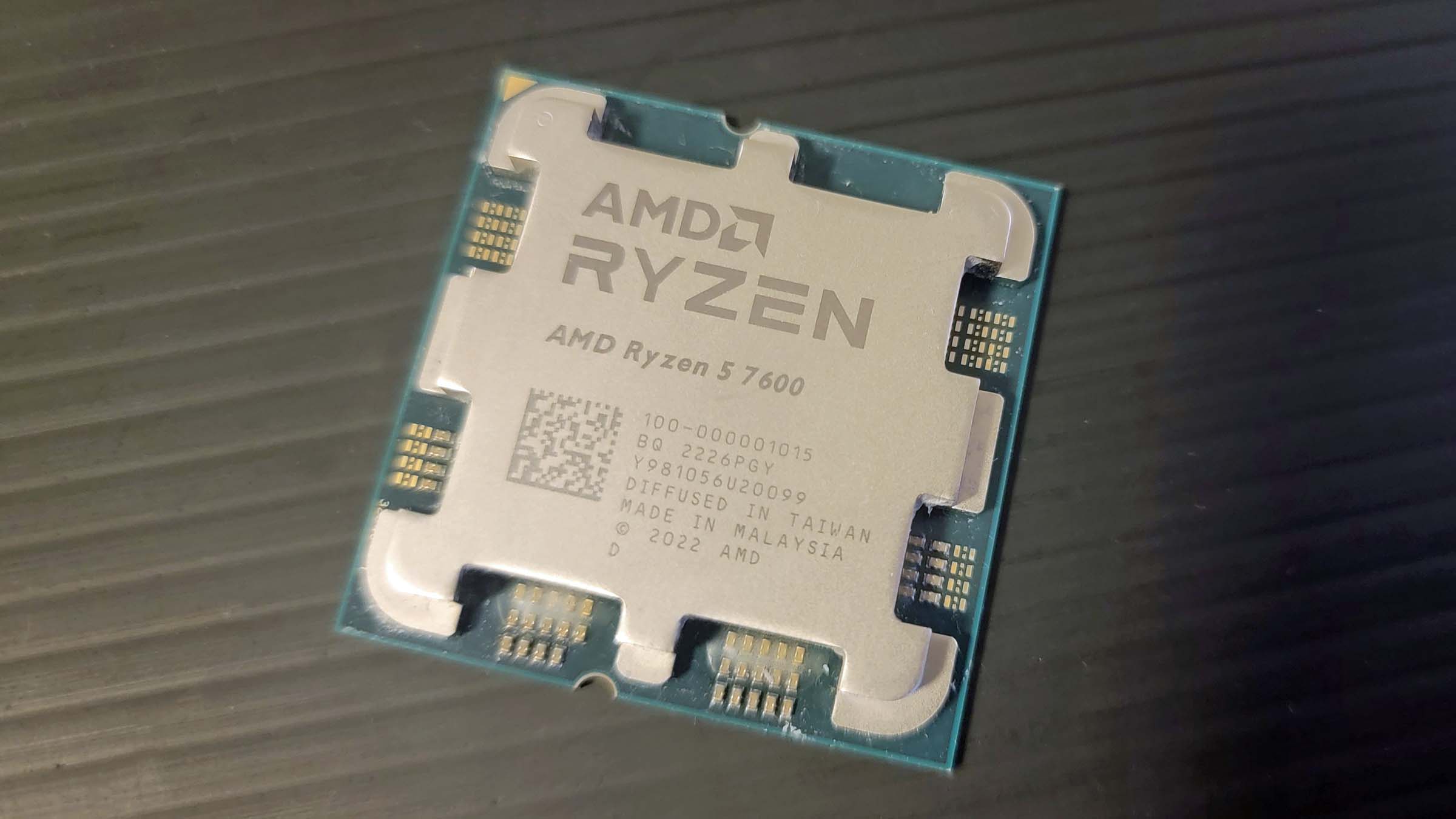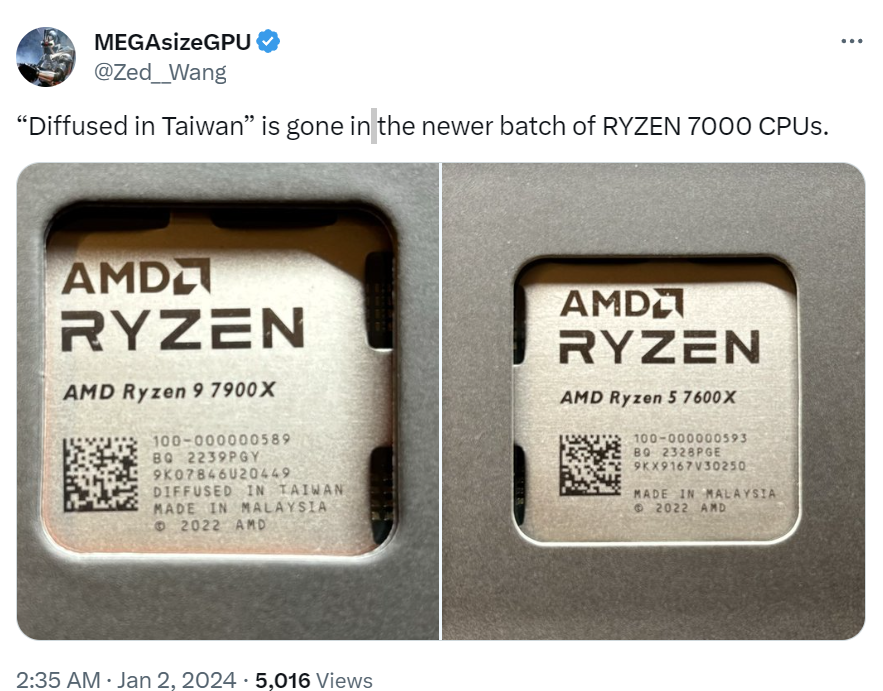AMD removes Taiwan branding from CPUs, says change wasn't made to appease China

Earlier this month, news emerged that AMD has removed all markings that mention that its chips are manufactured in Taiwan from its consumer Ryzen 7000 desktop PC processors, a move largely thought to be a reaction to demands from the People's Republic of China.
The changes made headlines in China, with many claiming yet another company had acquiesced to the PRC's insistence that products created in Taiwan be labeled as 'Made in China,' a demand often placed on Taiwanese products due to the contentious relationship between the two. Some theorized that the change would only apply to AMD processors shipped to China, while the remainder of the company's processors would still be labeled as 'Diffused in Taiwan.' However, AMD says this change applies to all of its processors and wasn't motivated by politics.
"AMD removed the country of diffusion from all new CPU and APU products in 2023 to align with the product marking process for our other products," an AMD spokesperson told Tom's Hardware, indicating that the company will no longer mark (silkscreen) any of its consumer or enterprise processors with the country where the silicon die inside the chip was originally fabricated (diffused). In the case of all of AMD's leading-edge products, those silicon dies are created in Taiwan at TSMC.
AMD chip markings: *️⃣'Diffused' denotes the silicon die chipmaking process. (etching, masking, diffusion, etc.) AMD uses this term to note where the die was fabricated. *️⃣ The 'Made in' marking denotes the location where the die is placed into the chip package and then tested (OSAT) -- i.e., mounted on a substrate (PCB) and then covered with the lid (IHS - Integrated Heat Spreader).
In the image below, the processor on the right has the new markings (via @Zed_Wang). The 'Diffused in Taiwan' line is now simply omitted from the top of the processor, while the rest of the text is not re-aligned to close the gap. Notably, AMD still marks the processors as "Made in Malaysia," which signifies where the processor die was integrated into the final chip package.
Sources close to the matter tell us that this decision was made as part of AMD's efforts to better align its production methods for its existing AMD products with the new Xilinx products that came with its $35 billion acquisition that closed in February 2022. Xilinx's products aren't marked with the country of diffusion, and this change will introduce uniformity across the company's entire product stack.
It is common not to have a country of manufacture marked on any given processor, so removing the markings certainly isn't out of bounds — for instance, chips from Intel and others often don't specify the country of manufacture.
While AMD's new chip marking strategy isn't officially due to political issues, there's no doubt that it also 'diffuses' long-standing issues with markings for products destined for China.
In the past, AMD was rumored to have delayed its Radeon RX 7900 launch in China due to packaging that listed Taiwan as the country of manufacture, and PC peripheral maker Corsair also ran afoul of public sentiment in China due to its packaging, spurring it to issue a public apology for "printing errors."
Get Tom's Hardware's best news and in-depth reviews, straight to your inbox.

Paul Alcorn is the Editor-in-Chief for Tom's Hardware US. He also writes news and reviews on CPUs, storage, and enterprise hardware.
-
AgentBirdnest What the heck is "diffusing", anyway?Reply
I'm not familiar with that term, in regards to chipmaking. -
bit_user Reply
I had assumed it's just putting on the heatspreader, but I don't really know. Given that we know the chips are actually made in Taiwan, I could be way off.AgentBirdnest said:What the heck is "diffusing", anyway?
I'm not familiar with that term, in regards to chipmaking. -
bit_user Reply
I'm disappointed, but not surprised.Kamen Rider Blade said:I'm incredibly disappointed in AMD for doing this.
Companies which try to take a political stand almost always pay a price for it. Given that it won't make any real difference, anyhow, I can't really hold it against them. -
Eximo I found a few old scientific papers. More in-depth step in the actual circuitry construction. It would seem to me you would use lithography to etch out what you don't want and the diffusion step is to place the other semiconductor material in the voids left behind. Diffusion says that it might be some sort of gas to condensate type process?Reply
From these diagrams:
http://www.bitsavers.org/components/motorola/_appNotes/Designing_Diffused_Integrated_Circuit_Resistors_Dec1962.pdf -
AgentBirdnest Reply
Interesting, thanks!Eximo said:I found a few old scientific papers. More in-depth step in the actual circuitry construction. It would seem to me you would use lithography to etch out what you don't want and the diffusion step is to place the other semiconductor material in the voids left behind. Diffusion says that it might be some sort of gas to condensate type process?
From these diagrams:
http://www.bitsavers.org/components/motorola/_appNotes/Designing_Diffused_Integrated_Circuit_Resistors_Dec1962.pdf -
Paul Alcorn These comments make me realize I should try to explain this better in the article.Reply
To provide clarity about the markings:
'Diffused' denotes the silicon die chipmaking process, etching, masking, diffusion, etc. AMD uses this term to note where the die was fabricated.
The 'Made in' marking denotes the location where the die is placed into the chip package and then tested (OSAT) -- i.e., mounted on a substrate (PCB) and then covered with the lid (IHS - Integrated Heat Spreader). -
Brian28 Reply
Disappointing, sure, but it seems that AMD was the outlier before this, as none of the other big names were printing Taiwan as a origin.Kamen Rider Blade said:I'm incredibly disappointed in AMD for doing this.
